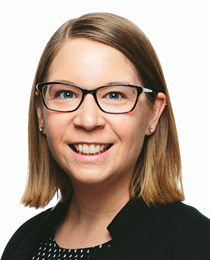
Caroline Manley
Center for Disability & Elder Law
Legal aid, elder law
Caroline Manley became director of Chicago's Center for Disability & Elder Law (CDEL) -- an agency that provides free legal services to low-income seniors and people with disabilities -- six months before the COVID-19 pandemic upended life in the United States and worldwide.
This threw new challenges Manley's way, forcing her to stretch herself beyond the role of a traditional executive director. Manley reacted quickly by leading CDEL’s staff in transitioning to remote programming and obtaining the necessary technology to make the continuation of services possible.
Manley successfully managed the unique challenges CDEL faced with navigating the pandemic, continuing services to clients, and maintaining and building vital relationships with volunteers and funders. She worked closely with CDEL’s Governing Board to transform the organization’s bylaws, recruit a diverse group of twelve new board members, and significantly increase revenue. Manley almost doubled CDEL’s budget in just three years by expanding its sources of funding. This additional support grew CDEL’s staff from eight to 14 members, allowing CDEL to better respond to the significant needs of its clients.
In short, Manley rose to the challenge and has successfully guided the center through this difficult time.
This performance isn't a surprise to Terri Ahrens, Assistant General Counsel at US Foods, who said that Manley has a history of strong leadership.
Manley initially joined CDEL as a fellow and created CDEL’s community legal clinics. She built her career and reputation on connecting with community partners in order to make CDEL’s legal services more accessible to low-income seniors and people with disabilities who are facing legal challenges. Manley has not only represented hundreds of clients on legal issue concerning housing, end of life planning, and consumer matters, but she has engaged hundreds of pro bono attorneys and student interns to further CDEL’s mission.
"Through her dedication, Caroline is instilling the value of pro bono service in generations to come," Ahrens said.
Manley is also an activist, one who isn't satisfied with simply reacting to legal issues. She has worked on several consumer initiatives over the years. Manley was instrumental with the Illinois Supreme Court Access to Justice Commission in the drafting and implementation of Supreme Court Rule 280, which strengthened pleading requirements in debt buyer and credit card collection cases. She also assisted on the drafting of an emergency Supreme Court order early in the pandemic to ensure that consumers with citations to discover assets had access to the funds in their bank accounts.
"I have worked with Caroline on several initiatives that highlighted her extraordinary ability to bring courtroom adversaries together to negotiate much-needed reforms," said Steven Pflaum, co-chair of the litigation department at Neal, Gerber & Eisenberg. "I attribute Caroline’s effectiveness as a negotiator of the Consumer Fairness Act of 2019 to her even-tempered demeanor -- I have never heard her raise her voice in anger—and consummate professionalism. Those attributes earned her the respect of opposing counsel and enabled her to bring together parties that appeared unlikely to agree on legislation."